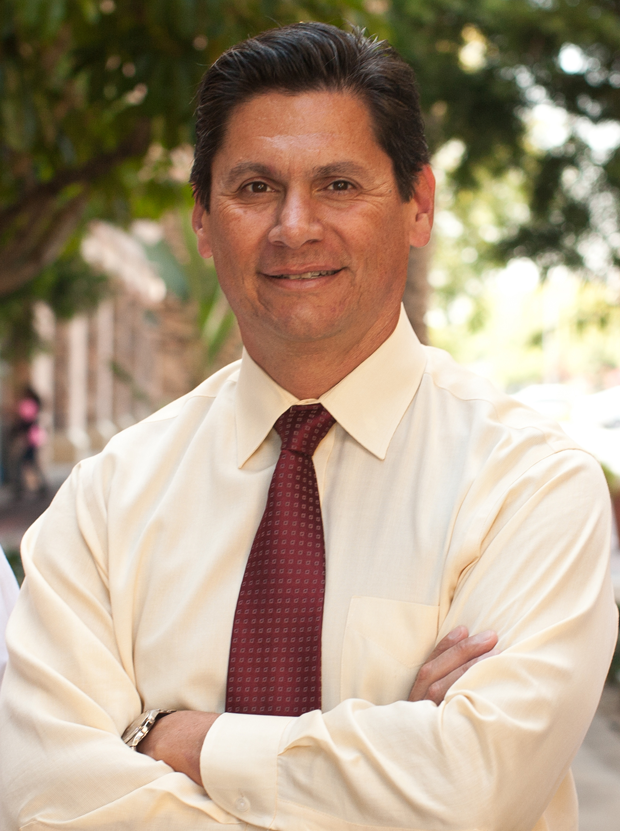 [Eds. Note: This is part two of a three part series, in which we check-in mid-year with the three men who head Long Beach’s educational institutions. This series also appears in our February print edition, available for free at more than 500 locations citywide. Click here to find a copy near you.]
[Eds. Note: This is part two of a three part series, in which we check-in mid-year with the three men who head Long Beach’s educational institutions. This series also appears in our February print edition, available for free at more than 500 locations citywide. Click here to find a copy near you.]
Although Long Beach City College has been facing major challenges in the last four years–eliminating positions, discontinuing programs and, most disconcerting, turning away capable students–President Eloy Ortiz Oakley, much like his other Long Beach education counterparts, remains hopeful though cautious.
“As far as Long Beach is concerned, we get the focus on improving the relationship between the [Long Beach Unified School District], Long Beach State and LBCC,” Oakley said. “I am proud we were able to maintain that focus through the Long Beach College Promise.”
The praise for the Promises Pathways initiative is not hyperbolic given that the initiative has not only gained statewide notoriety——Long Beach recently hosted a delegation from San Francisco which included the mayor’s office, as well as San Francisco’s unified school district, community college and Cal State University to examine how the initiative could be implemented elsewhere—but the fact that the numbers speak for themselves. The initiative’s first thousand students had a staggering 500% increase in transfer-level English completions and an equally staggering 200% increase in transfer-level math completions—with many of these gains being achieved by Latino and African-American students.
Oakley feels that despite significant budget cuts, LBCC, along with LBUSD and CSULB, will ultimately thrive——particularly thanks to this partnership——after turning the corner of what he feels can be legitimately described as the “greatest challenge to public education since the passage of Prop 13.”
That proposition, passed some 34 years ago, is the anti-tax bane upon public education’s back. Passed by an overwhelming 62.6% majority, the proposition effectively decreased and capped property taxes significantly while setting absurdly high thresholds on how our State can spend money——and that simultaneously shut out our public education system to billions of tax-dollar revenue.
The latent effects of Prop 13 along with the recession have led to cuts totaling millions of dollars since the 2008-2009 school year, including layoffs, reduced work hours and discontinuace of programs such as photography and automotive technology. In an announcement of such cuts early last year, Oakley stressed that these hard decisions were forced upon the college due to declining support from the state, but the passing of Proposition 30 last November (which eliminated the need for $4.8 million in trigger cuts) has renewed Oakley’s positivity in dark times.
 “I am excited about the fact that, while we have a way to go, we are at the end of these challenges,” Oakley said, noting that the school is also more prepared on how to handle cuts if necessary in the future. “But I can see that there is a light at the end of the tunnel——we’re moving forward.”
“I am excited about the fact that, while we have a way to go, we are at the end of these challenges,” Oakley said, noting that the school is also more prepared on how to handle cuts if necessary in the future. “But I can see that there is a light at the end of the tunnel——we’re moving forward.”
Beginning to align the college’s efforts with how the State plans on treating its community colleges is key within Oakley’s belief in survival. The governor’s budget policies in essence confirm what LBCC——in addition to LBUSD and CSULB——ave already been working on for years: aligning resources to make the system more economically efficient, streamlining the processes which students undergo and holding a deeper accountability towards the public.
“It has been a time of great change,” Oakley said. “When you’re right in the middle of a storm, it’s hard to see why we’re doing what we’re doing. But I strongly believe that as time goes on, people will understand that we were positioning the college to thrive in a different environment. Some may argue the environment that we’re moving into is not the best for our State or students—but nonetheless that is where we’re going.”
Oakley’s point could be misconstrued as passive or even apathetic, but one cannot entirely dismiss his reasoning—after all, President Obama on the federal as well as Governor Brown on the state level has pushed education into the model that is being formed. The crux lies not in attempting to alter the way in which education is being shifted more than it is about maintaining accomplishments within the new model. “For the first time, I can wake up and say that the work we have put in over the last two and three years has paid off,” Ortiz concluded. “I am glad the conversation is now turning towards how we BUILD our community colleges and our public education institution… We pride ourselves in Long Beach as a community in being leaders.”
Previously:

